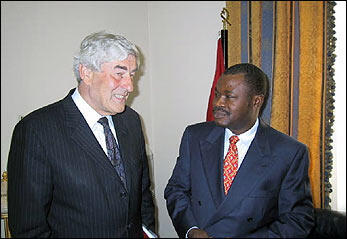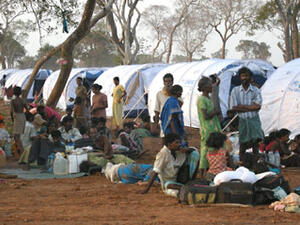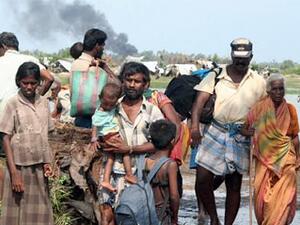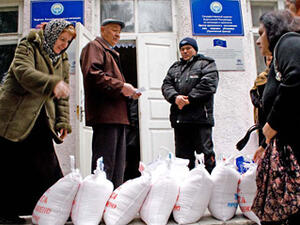Rehabilitate more areas for Angola's returnees, urges Lubbers
Rehabilitate more areas for Angola's returnees, urges Lubbers

Young returnees playing in the ruins of Cazombo in Moxico province.
LUANDA, Angola, August 22 (UNHCR) - UN refugee agency chief Ruud Lubbers today urged the Angolan government to prioritise the rehabilitation of war-torn areas so that more refugees can return home to Angola soon.
The High Commissioner arrived in the Angolan capital, Luanda, late Thursday on the second and final leg of a shortened Africa mission. During his visit to Angola, Lubbers plans to review various aspects of the Angolan repatriation operation that was formally launched by UNHCR on June 20 to assist the return of more than 200,000 Angolan refugees over the next two years.
On Friday, Lubbers held a series of meetings with senior government ministers in the Angolan government, among them the Minister of Foreign Affairs, João Bernardo de Miranda.
In his discussions with the foreign minister, Lubbers pledged UNHCR's continued support for the integration of returning Angolans, adding that the refugee agency was committed to opening up more areas for return. He appealed to the Angolan government to prioritise the rehabilitation of war-damaged infrastructure, explaining that in some cases, the lack of infrastructure had slowed down the agency's progress in opening up some areas for return.
"We are trying to open up more and more villages for return but we need the support of the government in this respect," Lubbers told the minister.
So far, 13 communes in the border provinces of Moxico, Zaire and Cuando Cubango are open for return. According to surveys carried out in refugee camps, this figure represents only half the total number of final destinations for refugees still in Zambia, the Democratic Republic of the Congo (DRC) and Namibia.
In the remaining areas of return that have not yet been declared safe for return, land mines need to be cleared while basic services such as water, schools and health care must be rehabilitated. In addition, road access to these areas needs to be viable while local administrative systems must be in place. Many of the returnee areas used to be held by UNITA (Union for the Total Independence of Angola), areas that have been heavily destroyed by the 27-year war. In many parts, roads and bridges are in dire need of repair.
Speaking about assistance to returnees who have made their own way home from refugee camps, the High Commissioner pledged added effort to ensure that spontaneous returnees receive the same assistance package as returnees arriving on UNHCR-organised convoys. Lubbers said that an improved registration system of all returnees would help the agency in providing aid to spontaneous returnees.
"There is a common interest from the government and UNHCR to expand the registration system," said Lubbers, adding that the situation in these remote areas needs to be improved to enable UNHCR and other aid bodies to start their work.
Returning Angolans receive food assistance until their first harvest. The refugee agency also provides a construction kit for shelter, blankets, soap, water buckets and jerry cans, plastic sheeting and kitchen sets. Agricultural tools will also be distributed in September in time for the planting season.

UN refugee agency chief Ruud Lubbers with the Angolan Foreign Minister, Joao Bernardo de Miranda, in Luanda.
The Angolan government estimates that some 130,000 Angolan refugees have returned home from neighbouring countries. An additional 17,000 have been assisted home by UNHCR since it launched the return programme in June this year.
High Commissioner Lubbers will get a first-hand experience of the Angolan repatriation operation when he visits UNHCR reception centres in the eastern province of Moxico on Saturday, where he will meet Angolan returnees just back from Zambia and the DRC.
The UN refugee agency chief will end his mission and return to Geneva on Sunday, cutting short a 10-day four-nation trip that started in the DRC and originally included Tanzania and Burundi as well.









